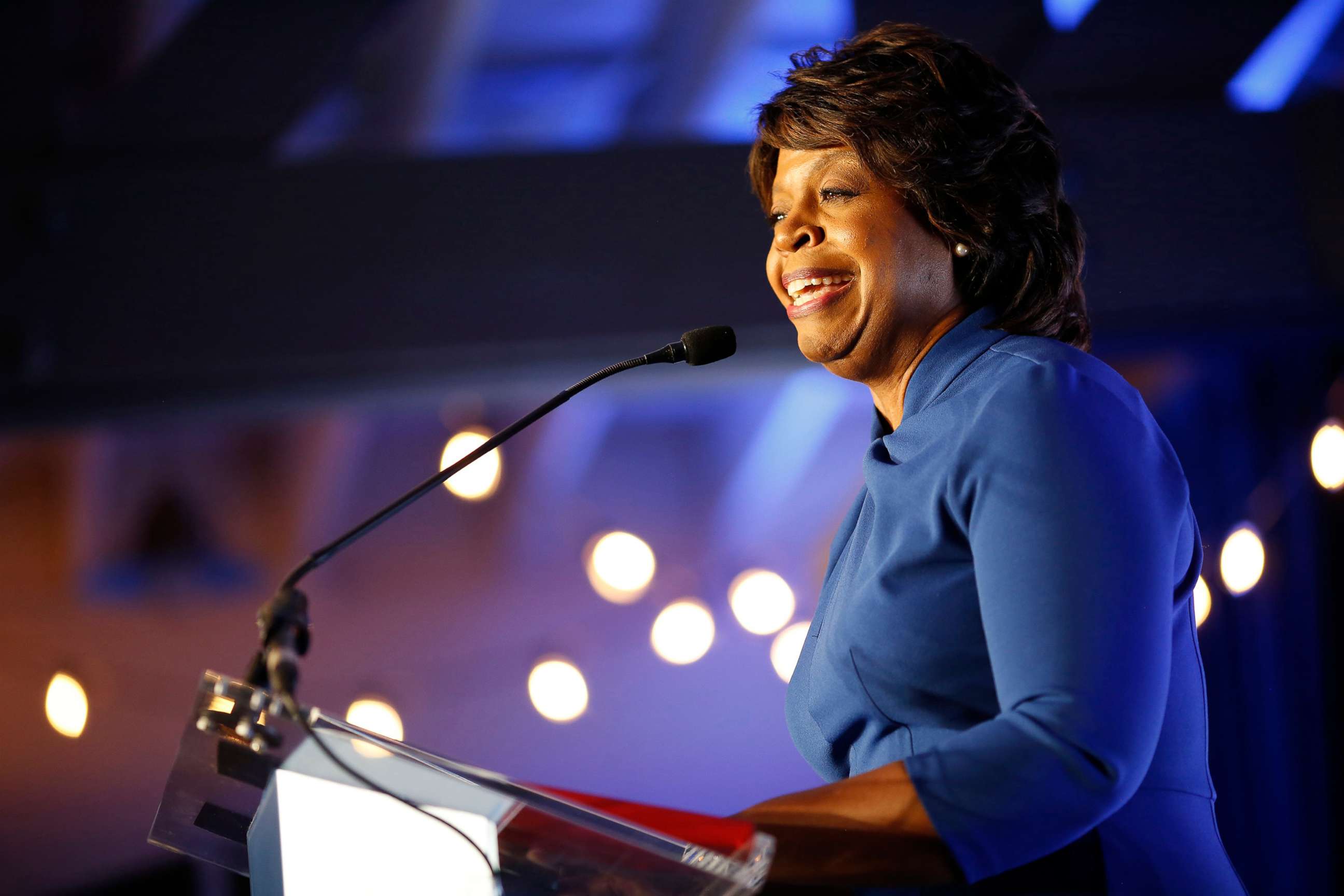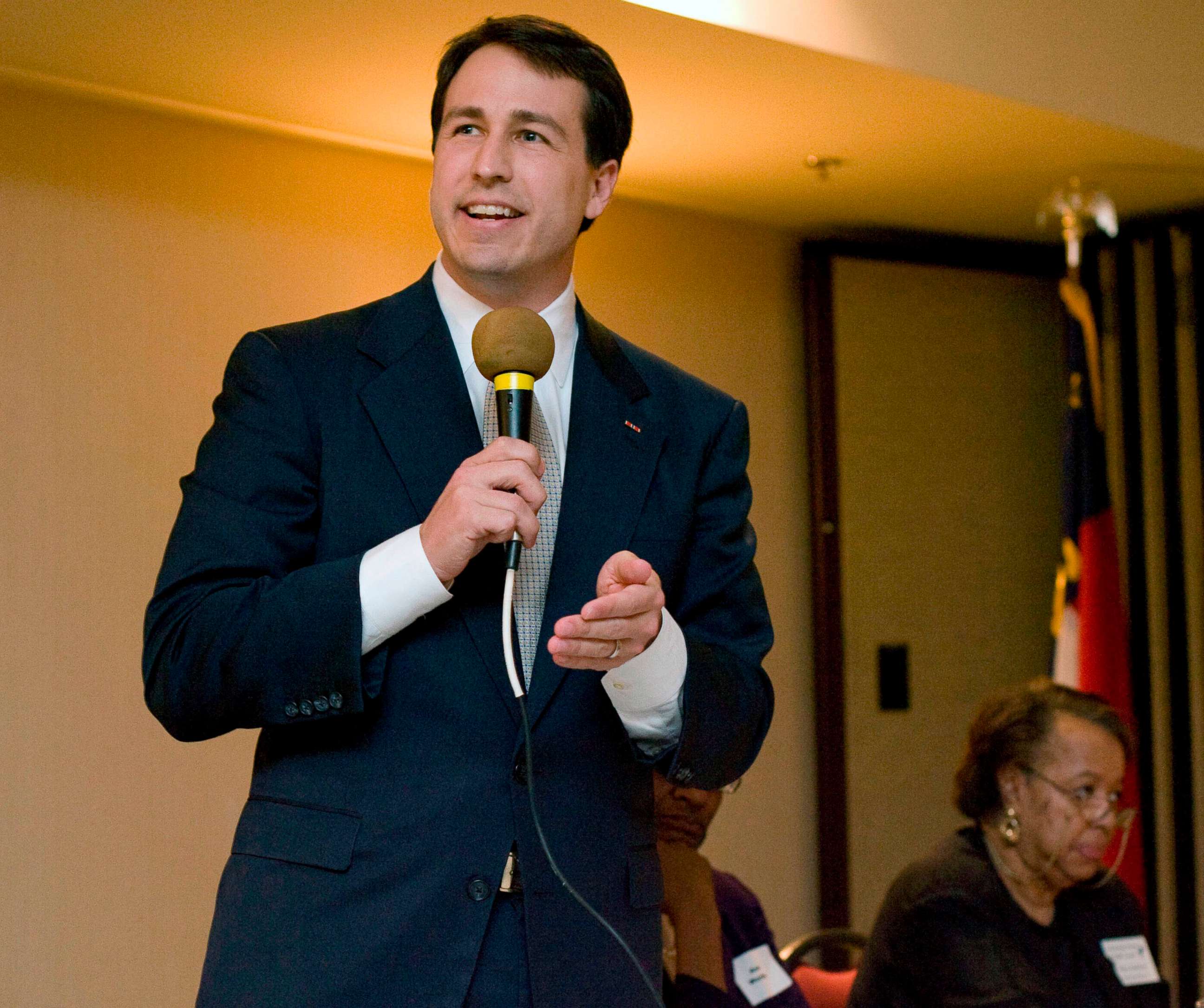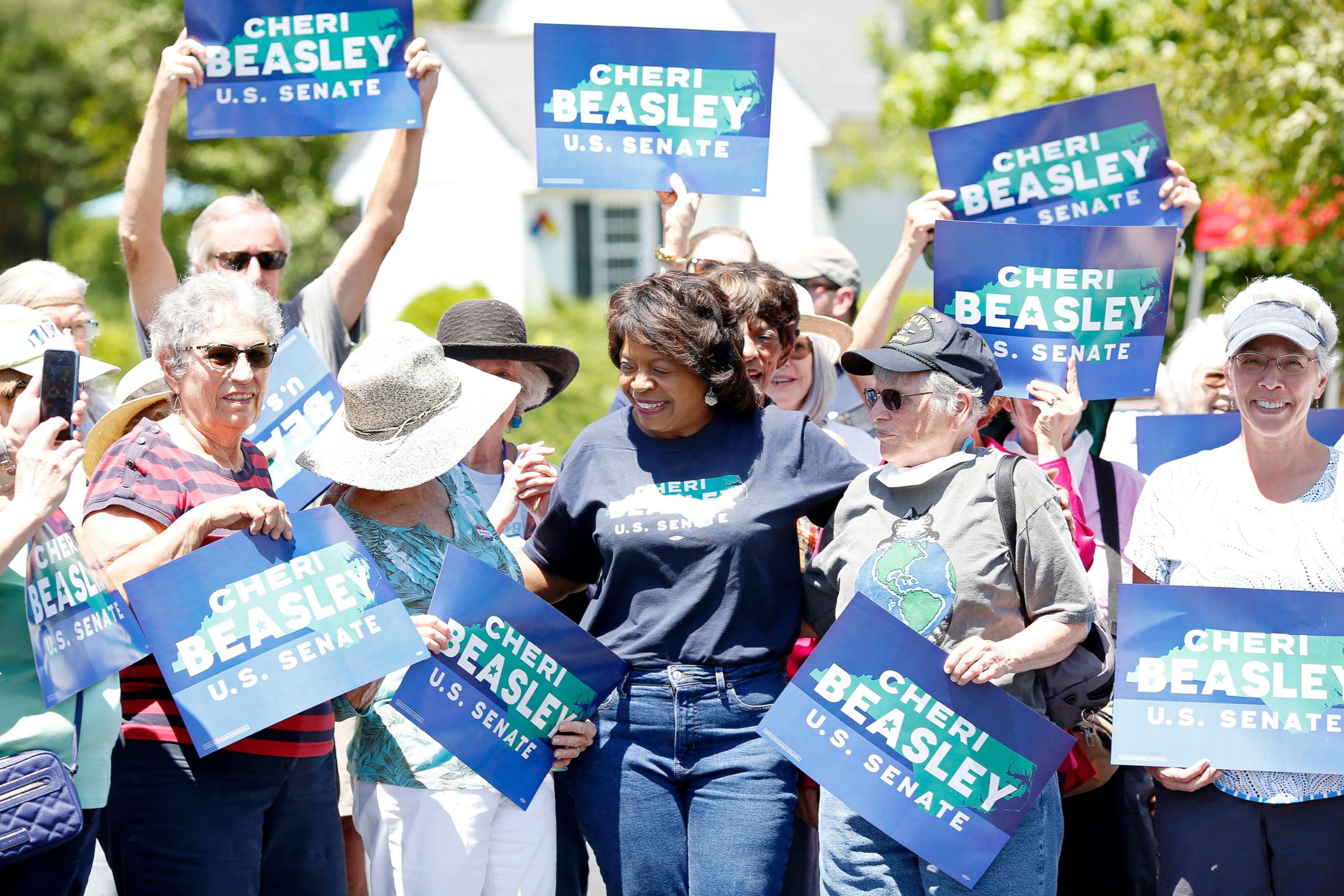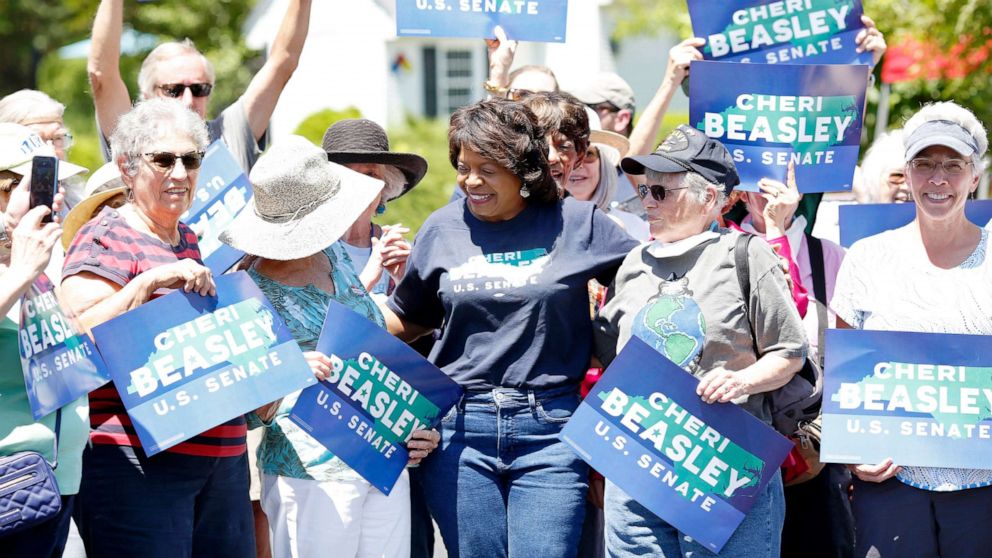NC Democrats grumble over national party investment in Senate race
Some North Carolina Democrats are growing increasingly piqued about what they say is insufficient support from the national party for Senate nominee Cheri Beasley, who appears to be getting caught in a midterm map crunch.
Democratic operatives and donors told ABC News they are bullish on their chances in the Tarheel State race to succeed retiring Republican Sen. Richard Burr -- and, the Democrats say, Beasley, a Black woman who served as state Supreme Court chief justice, is as strong a candidate as the party can put forth against Rep. Ted Budd, the GOP nominee.
But operatives believe getting her across the finish line in a persistently red-tinged swing state is going to take tens of millions of dollars in support from Washington, particularly after the state's 2020 race was one of the country's most expensive Senate contests and was decided by less than 2 points -- after the Democratic nominee admitted to an extramarital relationship.
Instead, operatives are seeing spending go to other purple states but not to North Carolina.
"The investment is incongruous. It's not necessarily that there's none of it, it's just that it's not keeping pace with -- A, what is needed to win in North Carolina; and B, what is being given elsewhere across the country," one Democratic strategist who's worked closely with campaigns in the state told ABC News.
"The race in North Carolina, which is as competitive as many of the other front-line races that are getting a lot of coverage across the country, we're not seeing the same kind of enthusiasm and emphasis," added the source, who requested anonymity to discuss party dynamics.
North Carolina has been a white whale for Democrats on the federal level in recent cycles: The party hasn't won a presidential or Senate race there since 2008, though they have had better success with state and local offices.
The party’s investment decisions this cycle could be partially fueled by the favorable environment the GOP is anticipated to enjoy this November amid stubbornly high inflation and other issues eroding President Joe Biden's approval ratings -- even though, according to FiveThirtyEight, Republicans have only a narrow advantage on the generic ballot question of which party should control Congress.
The national mood has forced Democrats onto a more defensive footing as they seek to at least retain -- rather than expand -- their fragile majorities in the House and Senate. Operatives in North Carolina told ABC News that the party may be prioritizing Pennsylvania and Wisconsin because of more recent success there.
North Carolina is narrowly divided between the two major parties, with registered Democrats outnumbering Republicans by a hair and with more than 2.5 million unaffiliated voters. But with a mushrooming population in urban and suburban Raleigh and Durham combined with shrinking populations in the rural expanses, Democrats see a state still within their grasp.
Early in the 2022 cycle, the Senate race was thought to be on par with other flip opportunities in Pennsylvania, where Republican Sen. Pat Toomey is also retiring, and Wisconsin where Republican Sen. Ron Johnson is running for a third term.
More recently, however, Democrats in North Carolina say they're getting short-changed by the national party, though top operatives in Washington insist they support Beasley and that the money will be there for her as November nears.
Operatives on the ground say Beasley –- one of two Black women nominated in any Democratic Senate primary this year and the first Black woman to win a major party's Senate nomination in North Carolina –- also offers a prime opportunity for the national party to put its money where its mouth is after promising to prioritize Black women, who are often its most reliable voters.
North Carolina was included in the Democratic Senatorial Campaign Committee's (DSCC) "Defend the Majority" program, a $30 million investment in organizing programs in nine states. However, the DSCC would not disclose how much is going to each state specifically and it did not include North Carolina in its initial round of ad buys.
Senate Majority PAC (SMP), Senate Democrats' main super PAC, has spent $2.1 million in ads in North Carolina, though its only reservation after August was a $700,000 ad reservation in the Charlotte market announced Tuesday.

National Democrats could still swoop in later to boost Beasley. But the funding so far pales in comparison to what's being funneled to Pennsylvania and Wisconsin as well as the $6.5 million and $27.6 million initially invested in North Carolina by the National Republican Senatorial Committee and Senate Leadership Fund, SMP's GOP counterpart, respectively.
"It's just not here at the level that it needs to be yet," said Morgan Jackson, a North Carolina Democratic strategist who worked on the campaign for 2020 Senate nominee Cal Cunningham.
"We know [Republicans] reserved their time," Jackson added. "Democrats are going to have to come in and help match some of that money for this race to stay competitive. And I think this is a race Cheri Beasley can win even in a challenging environment. But she can't win without a lot of support from the outside."
The DSCC's initial ad reservations included $3 million for Pennsylvania and Wisconsin each, and SMP has announced at least $5 million in ad buys in each state. Arizona, Georgia, Nevada and New Hampshire, where Democrats are defending incumbents, have enjoyed millions more in air cover.
"I think it's been surprising the lack of out-of-state money that has not yet come in North Carolina," said Michael Bitzer, a politics professor at Catawba College. "From a North Carolina point of view, I think that there feels like a missed opportunity to get invested. But if you look at the broader range of races that Democrats have to deal with … they're limited in terms of where they've got money to direct to those other races as well."
Still, Beasley is virtually tied with Budd in public polling so far, according to FiveThirtyEight's polling average, and has a gargantuan individual fundraising advantage over him, finishing June with $4.8 million on hand compared to $1.8 million for Budd. She's also demonstrated an ability to win statewide races and only lost her seat as chief justice in 2020 by about 400 votes in what was one North Carolina's closest races ever.
"The burden of proof is not on North Carolinians or Cheri Beasley or anyone down this side. The burden of proof is on the Democratic Party. And if they are deciding not to prioritize Cheri, fine, they should just have to answer as to why they have chosen not to back a woman of color who's a former chief justice, who is raising incredible money and can build a competitive coalition," said the strategist who's worked with North Carolina campaigns.
Prior to Beasley's nomination, top Democrats in North Carolina were mostly drawn to candidates like Cunningham or state Sen. Jeff Jackson, who has been hyped for years as a rising star and is now running for a House seat, in a state where more than 20% of the population is Black.
Two years ago, the DSCC and SMP combined to shower $60 million on Cunningham, albeit in a year with fewer vulnerable incumbents.

"Sometimes our actions don't match up with our words. And when we have really counted, especially, on African-American women to make a difference in a number of elections, too often we weren't nominating those same women to be the standard bearer for our party," North Carolina Democratic fundraiser Bruce Thompson told ABC News. "It's the right time for North Carolina to have a female African-American as our U.S. senator."
Strategists also say Beasley's candidacy hands Democrats a chance to try and energize a core constituency in a cycle that will largely be dictated by base turnout.
"She has an historic candidacy, and we've seen historic candidates oftentimes give a shot in the arm to their party and their voters because they have the chance to make history," Jackson said.
Groups in Washington insist they're still impressed with Beasley and are leaving the door open to reserving ad time for her later this year.
"North Carolina is a Senate battleground, and the contrast between Cheri Beasley’s strong campaign and focus on finding solutions for North Carolinians with Budd’s record of changing the rules to help himself and his special interest donors is making the race highly competitive," said DSCC spokesperson Amanda Sherman.
But privately, national Democrats bristle at questions on whether they're making North Carolina a priority.
When asked whether North Carolina is considered as competitive as Pennsylvania or Wisconsin, one Democrat involved in Senate races replied, "Kiss my a--."

Beyond contesting North Carolina this cycle or boosting a new party star, investing in the Tarheel State could also be crucial to keeping it as a battleground for future cycles, a valuable prospect in the Sun Belt (along with Arizona, Georgia and others) as longtime Democratic strongholds in the Midwest get more competitive.
Professor Bitzer and others who spoke to ABC News compared North Carolina to Georgia, where years of massive voter registration and other efforts laid the groundwork for Democrats' breakthrough successes in the 2020 cycle.
"There needs to be, from a grassroots infrastructure approach, a real long-term investment in making voters care to show up," Bitzer said.
"In the grand scheme of things, it's 51-49, 52-48, 49-48 [in Republicans' favor]," Bitzer added, "unless that commitment is made."




